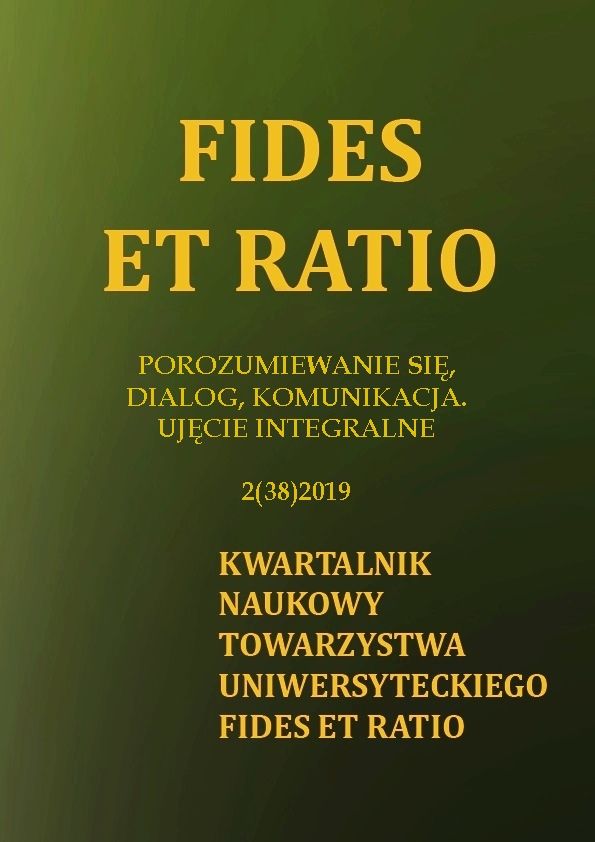Abstract
Communication is one of the most important aspects of a romantic relationship. Everything is information (non-verbal or verbal) even no reaction. As communication consists in the exchange of information, it is impossible not to communicate. The form of communication is humor. However, positive and negative humor should be distinguished, as it affects mental and physical health as well as human well-being. Humor has many functions in a romantic relationship. One of them is facilitating communication and dealing with conflicts. This article presents an overview of the relationship between humor and communication and conflict resolution in romantic relationships.References
Antonovici, L., Turliuc, M. N., Muraru, I. D. (2016). A systematic review of humor use in romantic relationships. Annals of AII Cuza University. Psychology Series, 25(2), 5-17.
Bippus, A. M. (2003). Humor motives, qualities, and reactions in recalled conflict episodes. Western Journal of Communication (includes Communication Reports), 67(4), 413-426.
Bippus, A. M., Young, S. L., Dunbar, N. E. (2011). Humor in conflict discussions: Comparing partners' perceptions. Humor, 24(3), 287-303.
Budzyna-Dawidowski, P. (1999). Komunikacja w rodzinie. W: B. de Barbaro (red.), Wprowadzenie do systemowego rozumienia rodziny (s. 56-68). Kraków: Wydawnictwo Uniwersytetu Jagiellońskiego.
Butzer, B., Kuiper, N. A. (2008). Humor use in romantic relationships: The effects
of relationship satisfaction and pleasant versus conflict situations. The Journal
of Psychology, 142(3), 245-260.
Campbell, L., Martin, R. A., Ward, J. R. (2008). An observational study of humor
use while resolving conflict in dating couples. Personal Relationships, 15(1), 41-55.
Cann, A., Zapata, C. L., Davis, H. B. (2009). Positive and negative styles of humor in communication: Evidence for the importance of considering both styles. Communication Quarterly, 57(4), 452-468.
De Koning, E., Weiss, R. L. (2002). The relational humor inventory: Functions
of humor in close relationships. American Journal of Family Therapy, 30(1), 1-18.
Driver, J.L., Gottman, J. M. (2004). Daily marital interactions and positive affect during marital conflict among newlywed couples. Family Process, 43(3), 301-314.
Grzesiuk, L., Trzebińska, E. (1978). Jak ludzie porozumiewają się. Warszawa: Nasza Księgarnia.
Hall, J. A. (2013). Humor in long-term romantic relationships: The association of general humor styles and relationship-specific functions with relationship satisfaction. Western Journal of Communication, 77(3), 272-292.
Hall, J. A. (2017). Humor in romantic relationships: A metaanalysis. Personal Relationships, 24(2), 306-322.
Honeycutt, J. M., Brown, R. (1998). Did you hear the one about?: Typological and spousal differences in the planning of jokes and sense of humor in marriage. Communication Quarterly, 46(3), 342-352.
Horan, S. M., Bochantin, J., Booth-Butterfield, M. (2012). Humor in high-stress relationships: Understanding communication in police officers' romantic relationships. Communication Studies, 63(5), 554-573.
Hornowska, E., Charytonik, J. (2011). Polska adaptacja Kwestionariusza Stylów Humoru (HSQ) R. Martina, P. Puhlik-Doris, G. Larsena, J. Gray i K. Weir. Studia Psychologiczne, 49(4), 5-22.
Johari, M. (2004). Humour and marital quality: Is humor style associated with marital success? Theses and Dissertations (Comprehensive),170, 1-97.
Lauer, R. H., Lauer, J. C., Kerr, S. T. (1990). The long-term marriage: Perceptions of stability and satisfaction. The International Journal of Aging and Human Development, 31(3), 189-195.
Lefcourt, H. M., Martin R. A. (1986). Humor and Life Stresss, Antidote to Adversity. New York: Ampersand Publisher Services. DOI: 10.107/978-1-4612-4900-9.
Maki, S. M., Booth-Butterfield, M., McMullen, A. (2012). Does our humor affect us?: An examination of a dyad's humor orientation. Communication Quarterly, 60(5), 649-664.
Martin, R.A. (2003). Sense of humor. In: Positive psychological assessment: A handbook of models and measures, S.J. Lopez & C. R. Snyder (eds.) 313-326, Ontario: University of Western Ontario.
Ryś, M. (1999). Psychologia małżeństwa w zarysie. Warszawa: Centrum Metodyczne Pomocy Psychologiczno-Pedagogicznej Ministerstwa Edukacji Narodowej.
Saroglou, V., Lacour, C., Demeure, M. E. (2010). Bad humor, bad marriage: Humor styles in divorced and married couples. Europe's Journal of Psychology,6, 94-121.
Tomczuk-Wasilewska, J. (2009). Psychologia humoru. Lublin: Wydawnictwo KUL.
Vela, L. E., Booth-Butterfield, M., Wanzer, M. B., Vallade, J. I. (2013). Relationships among humor, coping, relationship stress, and satisfaction in dating relationships: Replication and extension. Communication Research Reports, 30(1), 68-75.
